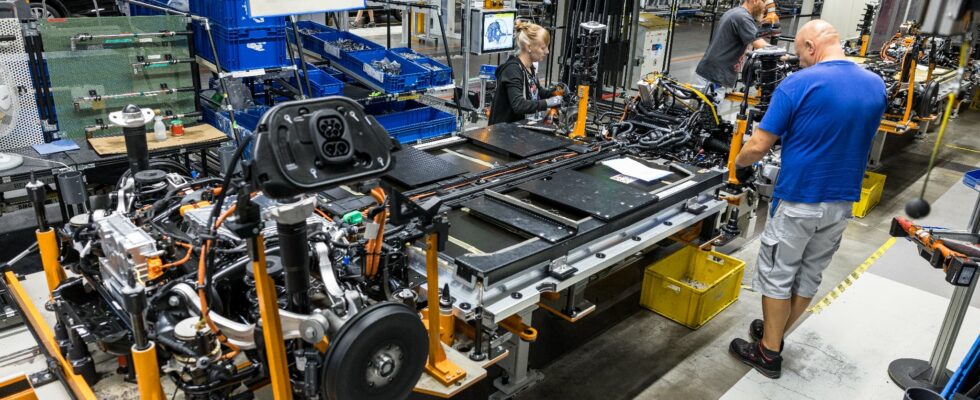Steel, alcohol, aluminum… and now the automobile. The list of products on which Donald Trump wishes to impose additional customs duties is growing. The American president announced on Wednesday March 26, 25 % of more taxes on Wednesday, March 26 on “all cars that are not manufactured in the United States”, a total tax of 27.5 % of the value, compared to 2.5 % before. These new taxes will come into force on April 2.
“I deeply regret the decision of the United States,” reacted Ursula von der Leyen, president of the European Commission, the executive body of the European Union, in a statement. It is also “very bad news” for the French Minister of Economy Eric Lombard, who called for a European response, that Berlin wishes “firm” against this new commercial offensive. Because if all the world manufacturers will be affected by these new taxes, Europe is particularly concerned: the United States is the first importer of European cars.
In total, more than 10 % of cars built in Europe are exported to the United States.
European manufacturers Standing wind
There will be “only losers” in “the trade war that opens” with the United States, reacted the automotive platform (PFA) on Thursday, which brings together the major manufacturers and equipment manufacturers present in France. “For Europe, this conflict is involved in the worst time, against a background of historical transformation, market crisis and competition intensification,” said the PFA.
Donald Trump’s announcements actually arrive in an already tense context. In 2024, reports the New York TimesEuropean car manufacturers have exported 38.4 billion euros in cars to North America, a drop of 4.6 % compared to 2023, according to the Association of European Automobile Manufacturers (ACEA). “We are urging the President (Donald) Trump to take into account the negative impact of customs duties not only on world car manufacturers, but also on American national industry,” ACEA said yesterday.
Particularly affected Germany
The impact could be particularly important for certain German car brands such as Porsche, BMW, Volkswagen and Mercedes Benz, which make between 12 and 25 % of their world sales in the United States. Germany is also the world’s leading exporter of cars, and therefore also the largest exporter of the EU. Thus, about one in four Porsche is exported to the United States, and one in six BMW.
If Mercedes, Volkswagen or BMW have some production sites in the United States and Mexico, this is not the case for all manufacturers, and this does not concern all car models – most high -end models from Germany or Eastern Europe. Porsche, for example, matters all his cars.
BMW estimated in mid-March the impact of the increase in American customs duties and EU taxes on vehicles produced in China at a billion euros in 2025.
According to the New York Timeswhich is based on analyzes of the Bernstein cabinet, customs duties could overall add up to $ 75 billion per year at the costs of car manufacturers, with a direct consequence for buyers: see the price of cars fly away. The Federation of German Automobiles (VDA) (VDA) also warned in a press release Thursday that the increase in customs duties “represents a considerable burden for companies and global supply chains” in the automotive industry, “with negative consequences, especially for consumers, including in North America”.
Recoil on the stock exchange of automobile values
The global and European automotive values fell in particular on Thursday after the announcements of Donald Trump. Around 10:00 am French time, on the Frankfurt Stock Exchange, BMW fell by 3.38 %, Mercedes of 4.65 %, Porsche of 4.88 %, Volkswagen ceded 2.84 %and continental 3.10 %. Around 10:30 am on the Paris Stock Exchange, Stellantis gave 4.19 % to 10.92 euros per share. The title of Renault, the least exposed European automaker in the United States, took 0.71 % at 49.35 euros.
According to RBC Capital Markets analysts to AFP, German manufacturers Mercedes, BMW and the American General Motors “would be the most affected”, followed by Ford in the United States and Stellantis in Europe, while Ferrari (-1.69 %) “should be able to repercuss the increases in customs duties fairly easily on its high-end customers”.
According to them, the American giant of Tesla electric vehicles “could however benefit from customs duties, taking into account national production”. However, Elon Musk also warned this Thursday morning on his social network X that additional customs duties would have a “significant” effect on the Tesla production cost, as this “will affect the price of the spare parts of Tesla cars which come from other countries”.
